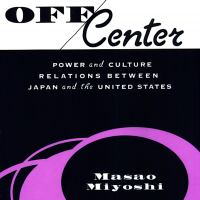"Off Center" is Japanese-born U.S. academic Masao Miyoshi's exposition of the asymmetrical relationship between Japan and the West.
Published in 1991, "Off Center" finds Japan under the yoke of Western hegemony. Miyoshi believes that Japanese intellectuals are trapped in the "third world" and can only be freed by engaging with historical power imbalances — this means recognizing Western aggression and hypocrisy while renouncing Japanese essentialism.
Off Center, by Masao Miyoshi
289 pages
Harvard University Press, Nonfiction.
Miyoshi describes this power imbalance through critiques of everything from trade agreements to novels. He reaches as far back as Daniel Defoe's "Robinson Crusoe," which he quickly exposes as "a colonialist's utopia." Miyoshi believes that Japan's apathetic contemporary novelists are complicit in sustaining the Eurocentrism Dafoe's novel championed. He dismisses Haruki Murakami, for example, as "an entirely easy read," concerned only with what "foreign buyers like."
Miyoshi's praise can be as emphatic as his scorn. This is particularly true for Kenzaburo Oe, who he describes as "one of the most intricate minds in the world today." Oe's novels examine the periphery of Japanese society, reframing literary discourse in much the same way Miyoshi hopes to shift cultural criticism.
"Off Center" presents a grim view of the Japanese intellectual landscape, but it challenges authors and critics to abandon their complacency and find solidarity with the marginalized.
Read archived reviews of Japanese classics at jtimes.jp/essential.

















With your current subscription plan you can comment on stories. However, before writing your first comment, please create a display name in the Profile section of your subscriber account page.